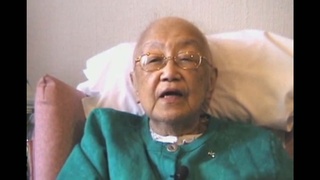Interviews
Parent's immigration to Peru
He went there with, he said, hundreds of Japanese men on a ship, so that takes a long time to get there. They said there's all this work in Peru, and he said immediately they found out there was very little. He said people starved. It's not like people could just pay and say, "Oh, I'm going to go back and fly back." There's no even taking a boat back. So he quickly went from his trade, which was being a carpenter, and did some farming, and then got into the laundry business and was successful with that. He ended up with three different laundries, and he was quite involved in the community there as well.
So when you're involved with the community and you start to grow his business, you became successful, and that's one of the reasons why he was targeted. And he was at a point where, I don't know for a fact how many people worked there at the three laundries, but to the point where he had a nanny to take care of the younger kids, a cook, they didn't drive them, but they would call their limo, so they were wealthy. Yes. And he was at his prime when they took all that away from him, the business, the property, of course, all the money that he had. That's probably the hardest part.
My mother, being the typical Japanese wife, just went along. She's a picture bride, and so she went along. It's not like she had a choice either.
Date: September 20, 2019
Location: California, US
Interviewer: Tom Ikeda and Yoko Nishimura
Contributed by: Watase Media Arts Center, Japanese American National Museum and Denshō: The Japanese American Legacy Project.
Explore More Videos

Grandfather's arrival in the U.S., experiencing discrimination
(b. 1939) Japanese American painter, printmaker & professor

Grandmother's experience in the U.S. as a picture bride
(b. 1939) Japanese American painter, printmaker & professor

Mother's immigration to U.S. as a treaty merchant
(b. 1927) Japanese American Nisei. Family voluntarily returned to Japan during WWII.

Why her parents came to Canada
(1918-2004) Interned in Slocan during World War II. Active member of the Japanese Canadian community.

Family background of Fredrick Yoshihide Sasaki
(b. 1918) Issei businessman in Canada

Chose to go back to Japan
(b.1924) Japanese Canadian Nisei. Interpreter for British Army in Japan after WWII. Active in Japanese Canadian community

Choice to move east or go to Japan
(b.1920) Japanese Canadian Nisei. Established the Ikenobo Ikebana Society of Toronto

Starting an import business after World War II
(b. 1921) Nisei businessman. Established "Made in Oregon" retail stores

Coming to America
(b.1943) Shin-issei grand master of taiko; founded San Francisco Taiko Dojo in 1968.

The reason for coming to Japan
(b. 1967) Hawai`i-born professional fighter in Japan


Peru Shimpo for the Nikkei community (Spanish)
(b. 1937) Professional journalist

Escaping to a small village in the mountains during the World War II (Spanish)
(b. 1937) Professional journalist


Father’s success in farm business
(b. 1922) Canadian Nisei who was unable to return to Canada from Japan until 1952
